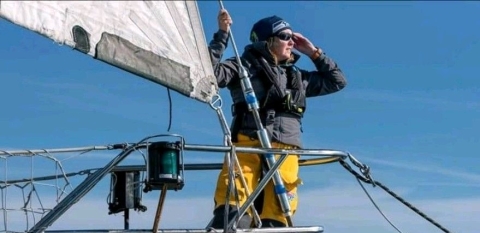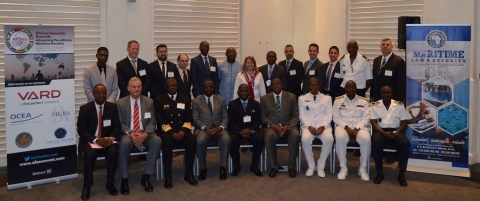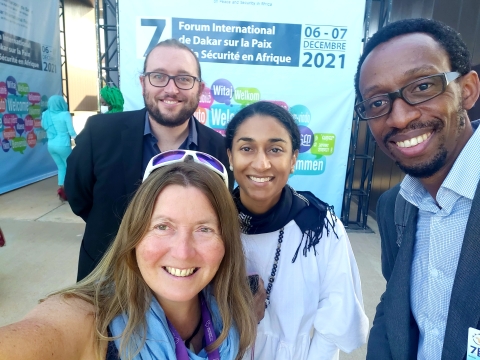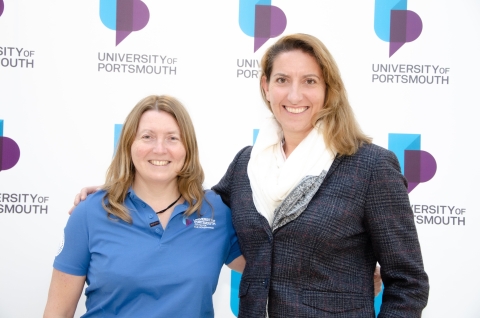

Each month, the Graduate School is sharing a Student Spotlight with our postgraduate research community, highlighting the amazing research being undertaken by our postgraduate researchers. Photo left - credit Clipper Race.
5 minutes
Our spotlight for October is Sophie Quintin, a final year PhD student in International Relations with the School of Area Studies, Sociology, History, Politics and Literature and associate researcher at the Centre for Blue Governance. After submitting her thesis in August, she shared with us her doctoral research journey at the University of Portsmouth exploring the issue area of maritime security. She also speaks about her passion for sailing fuelling her drive to promote ocean sustainability.
Researching Senegal
I passed a major benchmark of my PhD journey with the submission of my thesis entitled "From gaals to grey ships: a study of the development of Senegalese maritime security agency". While preparing for my viva scheduled for early December, I can now reflect on the evolution of my research project. With the piracy crisis off the coast of Somalia (2007-2013) and growing threats to security in the Gulf of Guinea for background, I had initially thought of exploring international maritime security cooperation mechanisms. However, following informal exchanges with chiefs of West African navies at a summit in Casablanca (photo below) which I co-moderated, my study was changed to focus on the topic of African maritime security agency. The causal link between naval power and economic prosperity is well-established in Western scholarship and strategic thought. The development of African navies and their capacity to securitise maritime spaces are critical to the growth of the continent's blue economy, but it has been largely overlooked as a subject of academic inquiry. Chats with the then Chief of the Senegalese Navy, Rear Admiral Momar Diagne, and my own research redirected my attention to the subject of African agency and coastal states' quest for maritime sovereignty in the post-colonial period.

Sophie (co-moderator) at the 2017 AFSEC West African Coastal Surveillance and Maritime Security Summit in Casablanca, Morocco.
The tendency of international security research to focus on what goes wrong – the emphasis on maritime violence in the southern parts of the Gulf of Guinea is a case in point in this regard - means that success stories are not researched. The quiet rise of the Senegalese Navy as a competent maritime security actor is an example which my study investigates. Hence, my thesis became a research journey to the most western point of the African continent with an investigation of the development by Senegal of its maritime security agency expressed in capabilities and its maritime strategic behaviour since independence (1960). It has sought to explain its rise as a regional naval power which now operates a modern fleet capable of carrying out a broad range of missions. With an analytical focus on its maritime strategic culture, it inter alia challenges the narrative of African sea blindness with a success story. With the encouragement of a fantastic supervision team and the support of my school and research centre, I was able to delve into the history and culture of a country I knew little about. My field trip to Senegal in the post-COVID period (November/December 2021) to conduct élite interviews and discover the country was a highlight of this research journey and propelled me to the Dakar Forum on Peace and Security to represent our university. It also reignited my enthusiasm for completing my study which had taken a hit during the lockdown period.

Sophie at the Dakar Forum with fellow researchers (Institute of Security Studies-Africa and International Crisis Group-Dakar).
Ocean governance and sustainability
When I finally landed in Dakar, I couldn’t wait to swim in the Atlantic Ocean because I love (and need) the connection with the sea. It is one of the reasons I love our island city of Portsmouth and why I chose our University. The big blue has always given me peace in moments of stress. Occasional surfing sessions gave me a good work/life balance during my stay. It also helped me understand how easy it is for Europeans to take our access to safe coastal waters for our leisure activities for granted. I sail in the Solent without the fear of piracy and that for example plastic pollution is being addressed. It was therefore interesting to discover that the Marine Nationale Sénégalaise is equipped and trained to protect the sea in case of oil spills and very active in the fight against Illegal Unregulated Unreported Fishing, a mission it takes very seriously as I could ascertain in my interviews and research. Maritime security exists in European waters because over centuries coastal states have built the capacity to control national jurisdictional zones. Since independence in the 1960s/70s, most African coastal states have struggled to control their maritime spaces leading in many cases to marine environments being polluted and/or plundered. That said Africa is constantly evolving and its agency in maritime affairs generally is rapidly growing. It is important to acknowledge this evolution in some areas with a positive narrative.
When it comes to securitising the sea and/or the protection of the ocean, a holistic collaborative approach is necessary. I have had the incredible privilege to be part of the team which prepared the launch of the Centre for Blue Governance in February 2020. Maritime security and the protection of the marine environment are two sides of the same coin, so I have been able to combine my research interest and my passion for sailing and the ocean. I have therefore been involved in a variety of activities for example recently preparing our contribution to the Royal Navy Strategic Studies Centre annual conference hosted by our university last May. I was delighted to receive positive feedback on my presentation from experts. Engaging with ocean sustainability actors in the world of offshore racing has also been another exciting aspect of my work. Thus, it is as a maritime security scholar and ocean racer that I promote ocean sustainability. During my participation in the Clipper Race in the 2019/20 edition interrupted by the pandemic and restarted in 2022, I planted mangroves in Bermuda for a local conservation project and was interviewed to discuss ocean sustainability. Making my sport more sustainable has become one of my personal missions which also aligns with the Ocean Decade agenda and the objectives of the UNESCO Chair on Ocean Governance held by Professor Pierre Failler. My doctoral research journey has not all been plain sailing. But just as a thesis starts with a first sentence, change always starts with small steps. I have taken many steps I never thought I could, and I have no intention of stopping.
Sophie Quintin, BA, LLM, MA and PhD candidate.

Sophie at the Centre for Blue Governance launch event photo with sailing star Dee Caffari.
If you would like to feature in our student spotlight section please email graduate.school@port.ac.uk to discuss this further.
